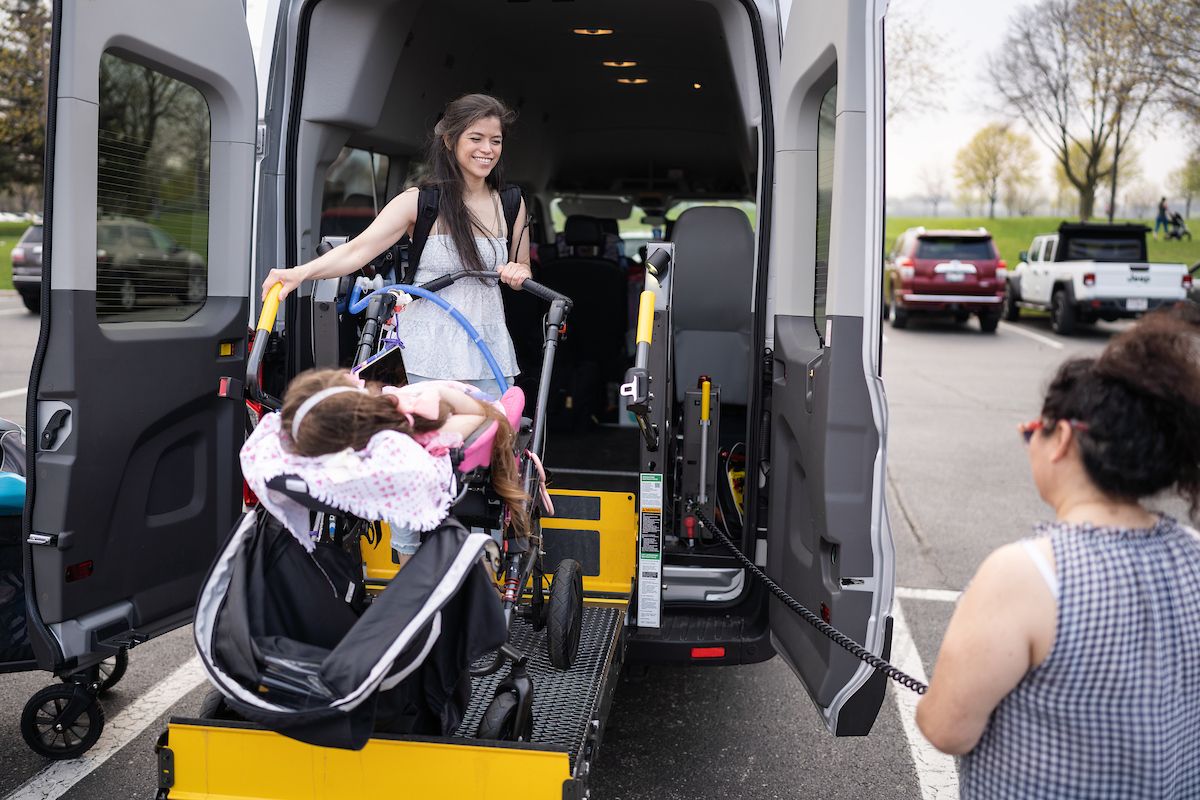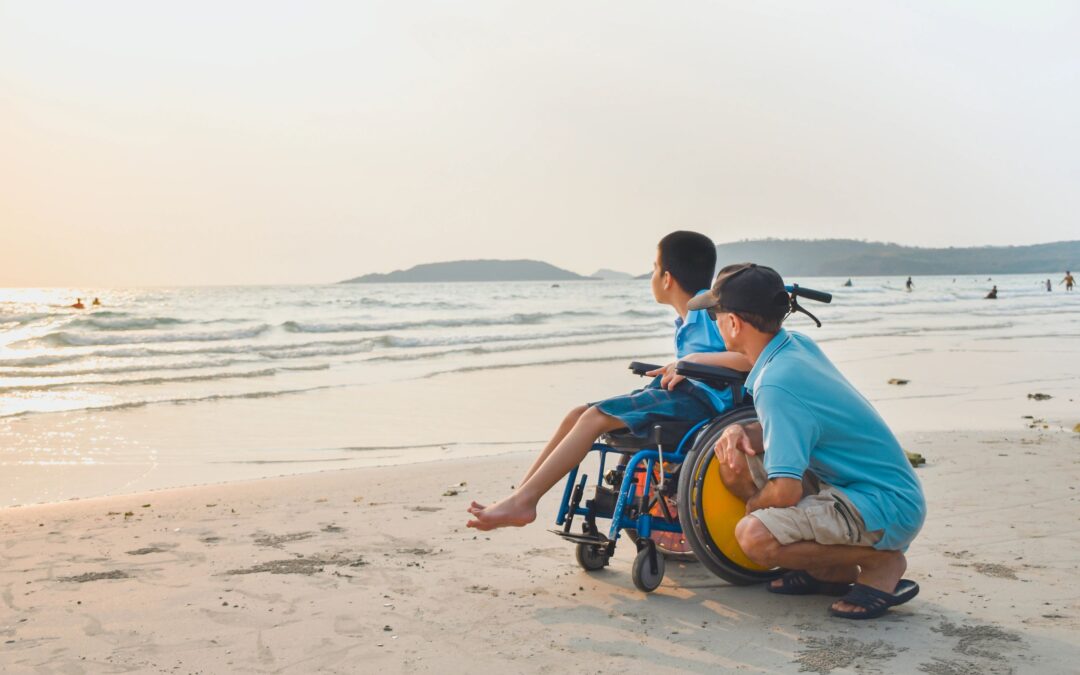Essential Travel Tips for Special Needs Families
Traveling with your special needs family members? Compile emergency contacts, secure travel insurance, and organize necessary paperwork. Pack medical supplies, suitable clothes, entertainment, and sensory tools. Choose accommodations with modifications, special amenities, and easy access. Explore accessible transport, pre-boarding assistance, and door-to-door support. Use visual aids, clear language, and encourage patience. Handle sensory overload by bringing tools, scheduling breaks, and finding calm spaces. Manage meds with clear labels, first aid kits, and essential supplies. Carry medical docs, emergency contacts, and inform travel companions. Plan accessible transport, accommodating accommodations, and necessary equipment. Bring comfort items, research sensory-friendly activities, and prepare for delays.
Key Takeaways
- Prepare emergency contacts and medical supplies.
- Choose suitable accommodations with necessary amenities.
- Arrange accessible transportation options.
- Manage sensory overload with breaks and calming tools.
- Pack medications, first aid kit, and essential supplies.
Planning and Preparation

When preparing for a trip with your special needs family member, it’s vital to plan and organize meticulously to guarantee a smooth and enjoyable experience for everyone involved. Start by compiling a list of emergency contacts, including doctors, specialists, and caregivers, in case any situation arises during your travels.
Make sure you have more than enough of the necessary medical supplies, such as medications, feeding tubes, or mobility aids, to last the duration of your trip and some extra in case of unexpected delays.
Additionally, it’s essential to secure travel insurance that covers any potential medical emergencies or trip cancellations. Familiarize yourself with the documentation requirements for your destination, including medical records, prescriptions, and any special permits needed for certain medical equipment.
Having all necessary paperwork in order can prevent any last-minute hassles and ensure a smoother journey for your family member with special needs. By taking these proactive steps in planning and preparation, you can set the stage for a stress-free and memorable travel experience.
Packing Essentials

Ensuring you pack the right essentials tailored to your special needs family member is essential for a successful and comfortable trip. When it comes to medical supplies, make a checklist of all medications, equipment, and supplies needed for the entire duration of your journey. It’s also wise to carry extra in case of unexpected delays.
Remember to pack comfortable clothing suitable for the climate and any sensory sensitivities your loved one may have. Having familiar items can provide a sense of security and ease any potential anxiety.
Entertainment is key to keeping everyone engaged during travel. Bring along favorite toys, books, or electronic devices to keep your family member entertained and occupied. Comfort items such as blankets, pillows, or even a favorite snack can go a long way in making the journey more enjoyable.
Consider noise-canceling headphones or sunglasses to help manage sensory overload in busy environments.
Choosing Suitable Accommodations
Choosing the appropriate accommodations is essential for guaranteeing a comfortable and stress-free stay for your special needs family member. When selecting a place to stay, consider room modifications that may be necessary, such as wheelchair accessibility, grab bars in the bathroom, or sensory-friendly lighting.
Location preferences are also vital – opt for accommodations close to medical facilities or with easy access to public transportation if needed.
Look for accommodation amenities that cater to your family member’s specific needs. Check if the hotel offers features like a pool lift, a room with a roll-in shower, or a fridge to store medications.
Don’t hesitate to make special requests when booking, such as hypoallergenic bedding, a quiet room away from elevators, or additional seating options.
Transportation Tips
When traveling with a family member who’s special needs, it’s important to explore accessible transport options and request pre-boarding assistance. These services can make your journey smoother and more comfortable, ensuring a stress-free travel experience for everyone involved.
Remember to inquire about these accommodations when booking your transportation to make your trip as seamless as possible.
Accessible Transport Options
Getting around through various cities with a family member who’s special needs can be made smoother by utilizing accessible transport options. When planning your trip, consider modes of transportation that offer wheelchair accessibility, such as buses or trains equipped with ramps and lifts.
Public transportation systems in many cities now provide accessible options, including designated spaces for wheelchairs and priority seating for those with special needs. Ride-sharing services also offer wheelchair-accessible vehicles in some locations, providing a convenient and flexible way to get around.
For a more tailored transport experience, look into specialized services that cater specifically to individuals with disabilities. These services often offer door-to-door assistance, ensuring a seamless journey from your accommodation to your destination.
Pre-Boarding Assistance
Managing the process of pre-boarding assistance can greatly enhance your travel experience when ensuring the comfort and ease of your family member with special needs. Understanding airport procedures and airline policies regarding pre-boarding assistance is essential.
Familiarize yourself with the specific requirements of the airline you’re flying with, as policies can vary. Contact the airline ahead of time to inform them of your family member’s needs and inquire about available support services.
Having family support or travel companions can also be beneficial during pre-boarding. They can assist in getting around the airport, carrying luggage, and providing emotional support to both you and your family member.
Additionally, having someone familiar with your loved one’s needs can help streamline the pre-boarding process and make it less stressful for everyone involved.
Communication Strategies
To enhance your travel experience as a special needs family, implementing effective communication strategies is essential. Visual schedules and social stories can be incredibly helpful tools to prepare your loved one for the journey ahead. These resources offer predictability and structure, easing anxiety and promoting a sense of security.
Additionally, using AAC (Augmentative and Alternative Communication) devices or communication boards can facilitate interactions and convey needs or preferences when verbal communication is challenging.
When traveling, make sure you have these communication aids readily available and easily accessible. Practice using them in various scenarios to build familiarity and comfort. Prioritize clear and simple language, allowing for better understanding and minimizing misunderstandings. Encourage patience and provide encouragement as your loved one navigates through different communication methods.
Managing Sensory Overload

When dealing with sensory overload while traveling as a special needs family, it’s important to be proactive in creating a calming environment for your loved one. Sensory tools can be incredibly helpful in managing overwhelming situations. Consider bringing along items like noise-canceling headphones, fidget toys, or weighted blankets to provide comfort and reduce anxiety. Additionally, practicing relaxation techniques such as deep breathing exercises or guided imagery can help your loved one stay calm during times of sensory overload.
Look for sensory-friendly activities or attractions at your destination that cater to individuals with special needs. These places often have features like quiet spaces, dim lighting, or designated sensory rooms that can offer a reprieve from overstimulation.
When planning your itinerary, try to schedule breaks in these sensory-friendly environments to prevent sensory overload before it happens.
Safety Measures
Ensuring the safety of your special needs family while traveling involves careful planning and proactive measures to address any potential risks or challenges that may arise.
Before starting on your journey, it’s vital to have a detailed safety plan in place. Make sure to carry a list of emergency contacts, including healthcare providers, local hospitals, and family members who can assist in case of an emergency. Communicate this plan to all family members, ensuring everyone is aware of what to do in different scenarios.
Additionally, managing medication and first aid is essential for a smooth travel experience. Pack all necessary medications in their original containers with clear labels, and carry more than enough for the duration of your trip. Include a first aid kit with essential supplies like bandages, antiseptic wipes, and any specialized items needed for your family’s specific needs.
Frequently Asked Questions
Can I Bring My Child’s Service Animal on the Trip?
Yes, you can bring your child’s service animal on the trip. Service animal regulations necessitate accommodations to be provided. When traveling with therapy animals or emotional support animals, make sure you have necessary documentation for a smooth journey.
Are There Any Special Dietary Options Available for My Family?
When meal planning for your family, it’s important to take into account special dietary options. Be sure to inquire about allergen awareness and communicate your needs clearly to guarantee a safe and enjoyable dining experience during your travels.
How Can I Find Inclusive Activities for My Special Needs Child?
You can discover inclusive activities for your special needs child by researching venues that offer adaptive equipment and sensory friendly accommodations. Check online resources, contact attractions directly, and inquire about tailored experiences to guarantee a smooth and enjoyable outing.
What Resources Are Available for Medical Emergencies in a Foreign Country?
If you encounter a medical emergency in a foreign country, language barriers can be challenging. Seek assistance from local healthcare facilities. They can provide necessary care and help you navigate the system effectively in times of need.
Are There Any Support Groups or Networks for Special Needs Families at My Destination?
When traveling, seek local connections for support. Look into community resources like support groups or networks for special needs families at your destination. These can provide valuable assistance and a sense of community during your trip.
Conclusion
As you begin your next travel adventure with your special needs family, remember to plan ahead, pack thoughtfully, and prioritize your loved one’s comfort and safety.
With careful preparation and open communication, you can create memorable and enjoyable experiences for everyone.
Don’t hesitate to reach out for support and resources along the way.
Traveling with special needs may have its challenges, but with patience and flexibility, you can make lasting memories together.
Safe travels!

Chad Adan Kace, a young dad from Vermont, shares his parenting journey with a touch of humor and lots of love. Father to a lively baby, he explores the joys and challenges of fatherhood through his stories.







